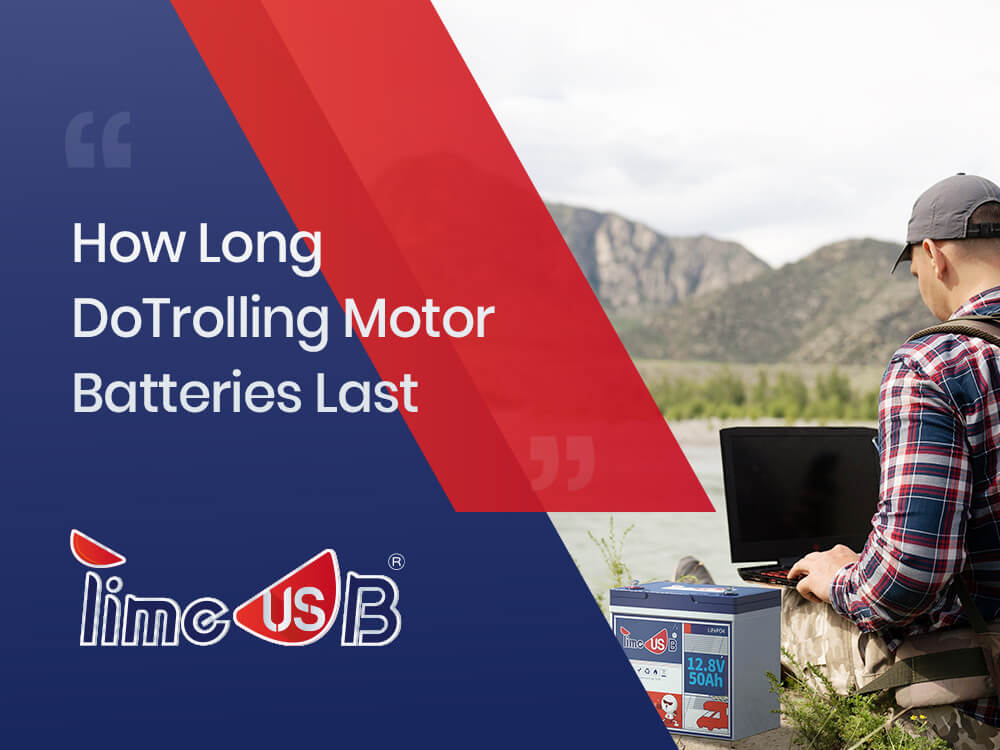Full Guide of Group 24 Deep Cycle Battery: Dimension, Features, Types
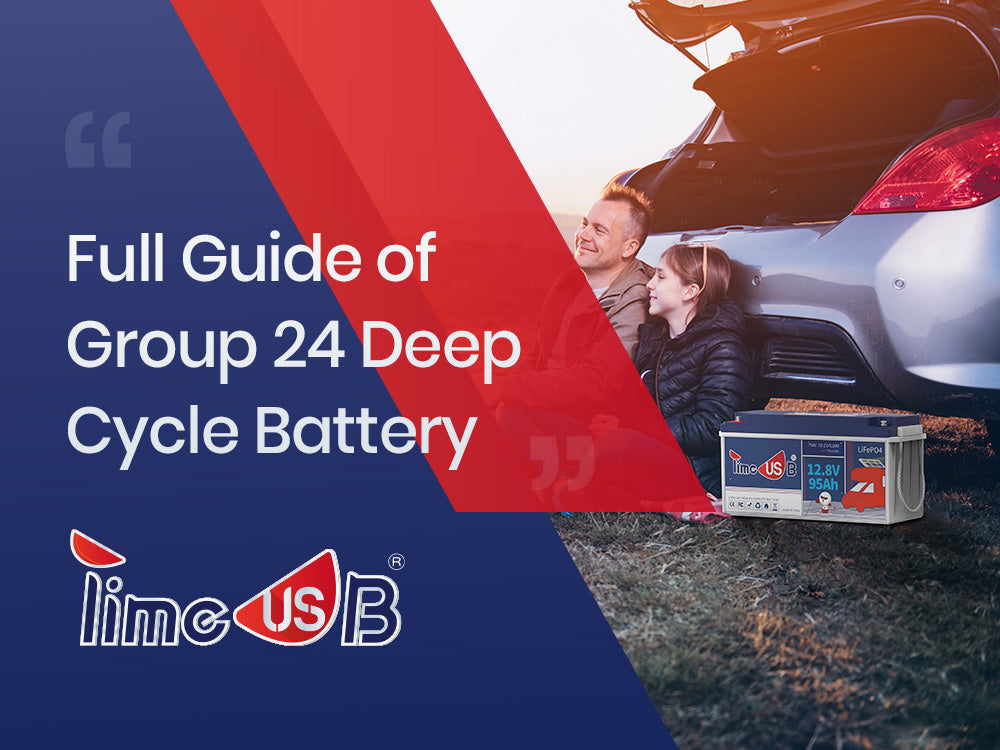
Deep cycle batteries are the unsung heroes behind many of our daily and recreational activities, powering everything from boats and RVs to solar panels and off-grid living essentials. Among the various types of deep cycle batteries, the Group 24 battery stands out as a popular choice for those needing reliable, long-lasting power.
In this guide, we'll delve into everything you need to know about Group 24 deep cycle batteries to help you understand their features, benefits, and how to get the most out of them.
What is a Group 24 Deep Cycle Battery?
First things first: "Group 24" refers to the physical size and terminal placement of the battery, according to the Battery Council International (BCI). The Group 24 battery typically measures around 10.25 inches in length, 6.8 inches in width, and 8.7 inches in height. This sizing determines the battery's compatibility with various installations. Timeusb Group 24 deep cycle lithium battery sizes 10.23*6.61*8.22 inches. And the size of Timeusb 24V 50Ah Lithium Battery for Trolling Motor is L10.24 x W6.61 x H8.27 inch.

|
BCI Group Size |
L x W x H (mm) |
L x W x H (inches) |
|
24 |
260 x 173 x 225 |
10 1/4 x 6 13/16 x 8 7/8 |
|
24F |
273 x 173 x 229 |
10 3/4 x 6 13/16 x 9 |
|
24H |
260 x 173 x 238 |
10 1/4 x 6 13/16 x 9 3/8 |
|
24R |
260 x 173 x 229 |
10 1/4 x 6 13/16 x 9 |
|
24T |
260 x 173 x 248 |
10 1/4 x 6 13/16 x 9 3/4 |
A deep cycle battery is designed to provide a steady amount of power over a long period, unlike starter batteries which deliver a large burst of power to start engines. Group 24 deep cycle batteries are designed to be discharged and recharged many times, making them ideal for applications where you need consistent, long-term power.
Features of Group 24 Deep Cycle Batteries: Pros and Cons
Group 24 deep cycle batteries are a commonly utilized power source across a variety of applications, known for their specific size and energy storage capacity. Here's a rundown of their features, along with their respective pros and cons:
Features of Group 24 Deep Cycle Batteries
Physical Dimensions: Group 24 batteries typically measure around 10.25 x 6.8 x 8.7 inches, enabling them to fit in a standardized battery space in various vehicles and systems.
Capacity: These batteries generally have a capacity range that varies but can typically be around 70-85 amp-hours (Ah). This capacity determines how much energy they can store and supply over time.
Voltage: The standard voltage for a Group 24 battery is 12 volts, which is suitable for most marine, RV, and solar energy systems.
Deep Discharge: Group 24 batteries are designed to be deeply discharged and recharged many times over their life cycle, making them ideal for continuous use applications.
Construction Types: They can come in different builds, including flooded lead-acid, gel, AGM, and in some cases, lithium-ion.
Maintenance Levels: Depending on the type (flooded, gel, or AGM), the maintenance can range from regular checks and topping up of water for flooded batteries to virtually no maintenance for AGM and gel types.
Pros of Group 24 Deep Cycle Batteries
Versatility: Their size and energy output make them well-suited for a range of uses, from marine and automotive to renewable energy storage.
Durability: Well-constructed Group 24 batteries are known for their durability and ability to withstand numerous charge and discharge cycles.
Relatively High Capacity: For personal and recreational use, these batteries offer ample capacity to power electronics, small appliances, and other necessities.
Maintenance Options: You can choose between different types of maintenance levels according to your preference and ability to carry out regular servicing.
Widely Available: As a standard size, group 24 batteries are readily available from a variety of manufacturers, with many options in terms of type and price.
Cons of Lead-Acid Group 24 Deep Cycle Batteries
Weight: Lead-acid Group 24 batteries might be heavy, making installation and transportation difficult. Upgrade to lithium batteries can solve this problem.
Limited Lifespan Compared to Some Alternatives: While durable, they may not last as long as lithium-ion batteries, which can have a more extended lifespan.
Lower Energy Density: Compared to more modern lithium-ion batteries, lead-acid, gel, and even AGM Group 24 batteries have a lower energy density.
Regular Maintenance Required for Some Types: Flooded lead-acid batteries, in particular, require regular maintenance, which may not be convenient for all users.
Temperature Sensitivity: Like many batteries, Group 24 batteries can be sensitive to extreme temperatures, which can affect performance and lifespan.
Choosing the right Group 24 deep cycle battery will depend on balancing these attributes with the specific needs of your application. Whether you prioritize maintenance-free operation, cost, capacity, or lifespan, there's a Group 24 battery design that will fit those requirements. It's always important to compare various models and types before making an investment.
Applications of Group 24 Batteries
Group 24 deep cycle batteries are versatile and robust, apt for a multitude of applications where consistent and reliable energy is required over extended periods. Here are some of the most common uses for these powerful energy sources:

Recreational Vehicles (RVs)
For those who love life on the road, Group 24 batteries are common in RVs as house batteries. They power everything from lights to appliances when not connected to shore power or when the generator is not running.
Marine Use
Boats often use Group 24 deep cycle batteries to power trolling motors, onboard electronics, lights, and other equipment that needs steady power over long periods. Because of their deep discharge capability, they are preferred for marine applications, where reliability can make or break a day on the water.
Solar Power Systems
In solar installations, particularly in residential solar power systems, Group 24 batteries can act as the storage component, collecting energy from the solar panels during the day to be used at night or on cloudy days.
Mobility Scooters and Wheelchairs
Mobility devices such as electric wheelchairs and scooters often use deep cycle batteries to ensure users can travel considerable distances between charges.
Off-Grid Energy Storage
For cabins or homes that are off the grid, Group 24 deep cycle batteries can store energy from wind or solar systems, or generator sets, allowing for electrical power where the grid does not reach.
Renewable Energy Projects
In addition to residential solar power setups, Group 24 batteries are also used in other renewable energy applications, such as small wind energy systems, where storing energy reliably is key to ensuring a continuous power supply.
Backup Power
In cases of power outages, Group 24 batteries can be used to keep essential home systems running, such as sump pumps, emergency lighting, or medical equipment like CPAP machines.
Portable Power Stations
DIYers and specialists create portable power packs using Group 24 batteries for use in various applications, from camping trips to professional film shoots where electricity is not readily available.
Lawn and Garden Equipment
Some larger lawn and garden equipment such as mowers or tractors might utilize a Group 24 deep cycle battery for power, especially those designed for prolonged use.
Commercial Equipment
In commercial settings, Group 24 batteries might be found in cleaning machines, such as floor scrubbers, or in heavy-duty power tools that require sustainable energy delivery.
Uninterruptible Power Supplies (UPS)
Businesses and data centers often use Group 24 batteries within larger UPS systems to ensure critical systems remain operational during power interruptions.
One of the reasons Group 24 batteries are sought after for these applications is their balance of size, capacity, and power output, making them large enough to hold a substantial amount of energy yet still compact enough to fit into a variety of equipment or storage spaces. Additionally, their deep discharge capacity allows them to be used extensively and recharged over and over, essential for applications where continuous power is needed.
Choosing the Right Group 24 Deep Cycle Battery
When picking a Group 24 battery, consider the following factors:
Capacity: Measured in amp-hours (Ah), capacity indicates how much energy the battery can store. A higher number means more power and longer use between charges.
Voltage: Most Group 24 batteries are 12 volts, which suits most applications they're designed for.
Reserve Capacity: This number tells you how many minutes a battery can run a specified load before it needs recharging.
Application: Consider the specific needs of your application, whether it's for marine, RV, solar, or any other purpose.
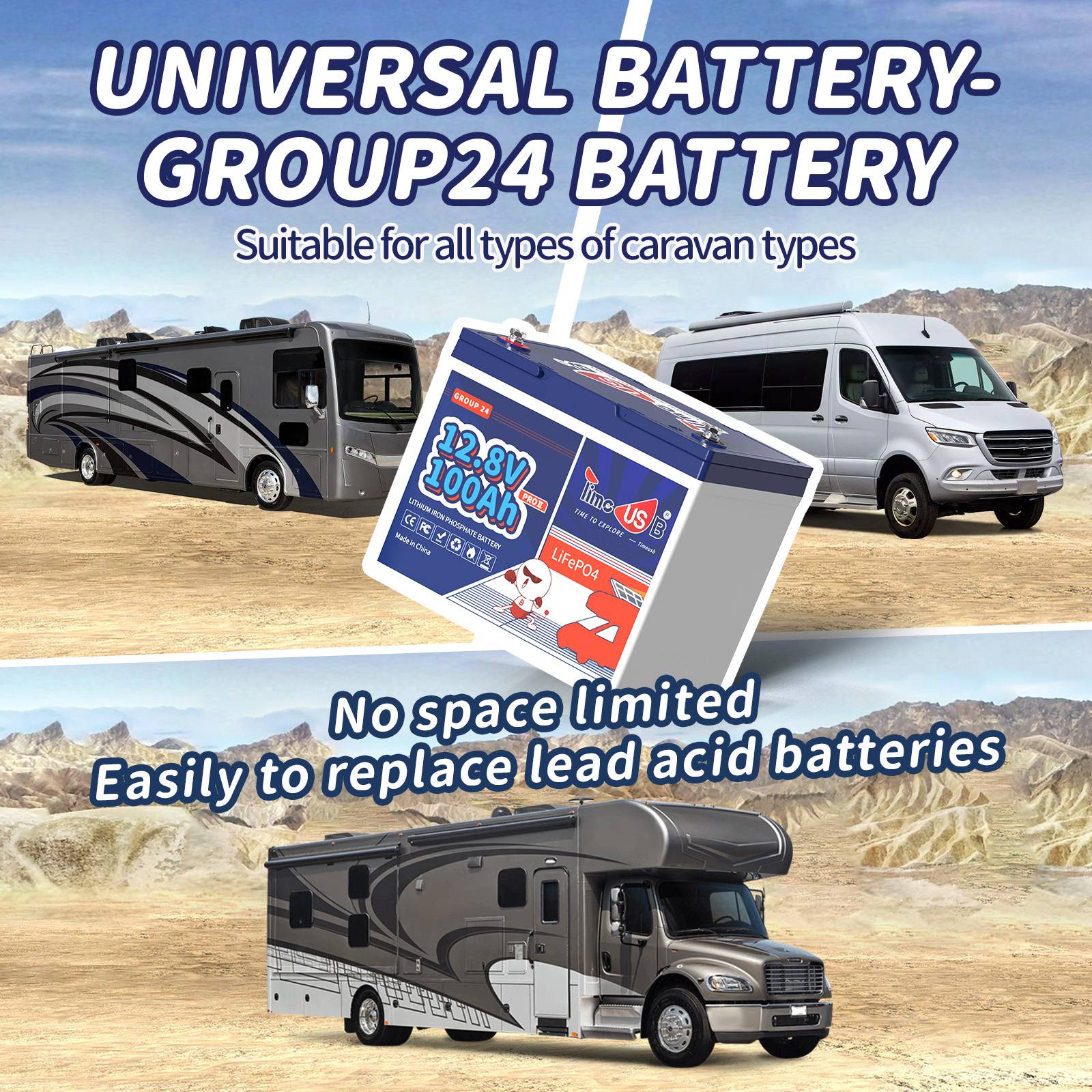
Types of Group 24 Deep Cycle Batteries
There are several types of Group 24 deep cycle batteries that you might consider for a variety of applications, like renewable energy systems, marine use, RVs, and backup power systems. Here's a closer look at each type:
Flooded Lead-Acid (FLA) Batteries
Pros:
- Generally the least expensive option.
- Mature technology with well-understood characteristics.
Cons:
- Require regular maintenance including water level checks and refilling with distilled water.
- Venting required to manage gas release during charging.
- Must be kept upright to avoid leakage of the acid.
Flooded lead-acid batteries are the traditional choice. They often require more upkeep and are best for installations where the battery will be accessed regularly for maintenance.
Gel Batteries
Pros:
- Maintenance-free and no watering required.
- Better vibration resistance and leak-proof compared to FLA batteries.
- Can be used in various positions and orientations.
Cons:
- More sensitive to charging parameters; overcharging can damage the battery.
- Typically more expensive than flooded lead-acid batteries.
Gel batteries use a thick, pasty electrolyte, which means they can be used in different orientations and are often better for tough conditions, like marine environments.
Absorbed Glass Mat (AGM) Batteries
Pros:
- Sealed and maintenance-free, no watering necessary.
- Better resistance to vibration and shock.
- Lower self-discharge rate than FLA and some gel batteries.
- Capable of quick charging and large power discharges.
Cons:
- More expensive compared to FLA batteries.
- Could be damaged by overcharging.
AGM batteries are often used in high-performance applications and where energy demands may suddenly increase, such as starter/house power in boats and RVs.
Lithium Battery
Pros:
- High energy density: more energy for their size compared to other types.
- Low maintenance and a longer lifecycle.
- Better depth of discharge (DoD), efficiency, and faster recharging.
Cons:
- Significantly more expensive initial investment.
- Requires specialized charging equipment and battery management system (BMS).
Often used in applications where weight and efficiency are primary concerns, or in advanced, off-grid systems due to their higher energy density and low maintenance.
How to Maximize the Lifespan of Your Group 24 Deep Cycle Battery
Here are some tips for extending the life of your battery:
Regular Charging: Deep cycle batteries should be charged after each use and never left in a discharged state.
Proper Storage: When not in use, store your battery in a cool, dry place and make sure it's fully charged.
Regular Maintenance: For flooded lead-acid batteries, check the water levels and top up as necessary with distilled water. However, lithium battery is maintenance-free, if you are tired about the regular adding water, upgrading to lithium battery is a wise investment.
Charge Correctly: Use a charger that's compatible with your battery type, and follow the manufacturer's charging instructions. Related reading: How to Properly Charge LiFePO4 Lithium Batteries?
Avoid Extreme Temperatures: Both high and low temperatures can negatively affect your battery's performance and lifespan.
Discover the Timeusb Advantage with Our Group 24 Lithium Batteries
At Timeusb, we recognize that switching to a lithium battery is an investment in both your equipment and your peace of mind. While our lithium Group 24 batteries may carry a higher price tag upfront compared to lead-acid counterparts, we're committed to showing our customers the unmatched long-term value and superior performance they'll enjoy with our products.
Making the Investment Worthwhile
Long-Term Savings: Over time, Timeusb lithium batteries prove more cost-effective. The life cycles of Timeusb lithium batteries are 4000+. With a significantly longer lifespan than lead-acid batteries, our lithium technology reduces the frequency of replacements. This longevity not only balances out the initial cost but offers real savings over the lifespan of the battery.
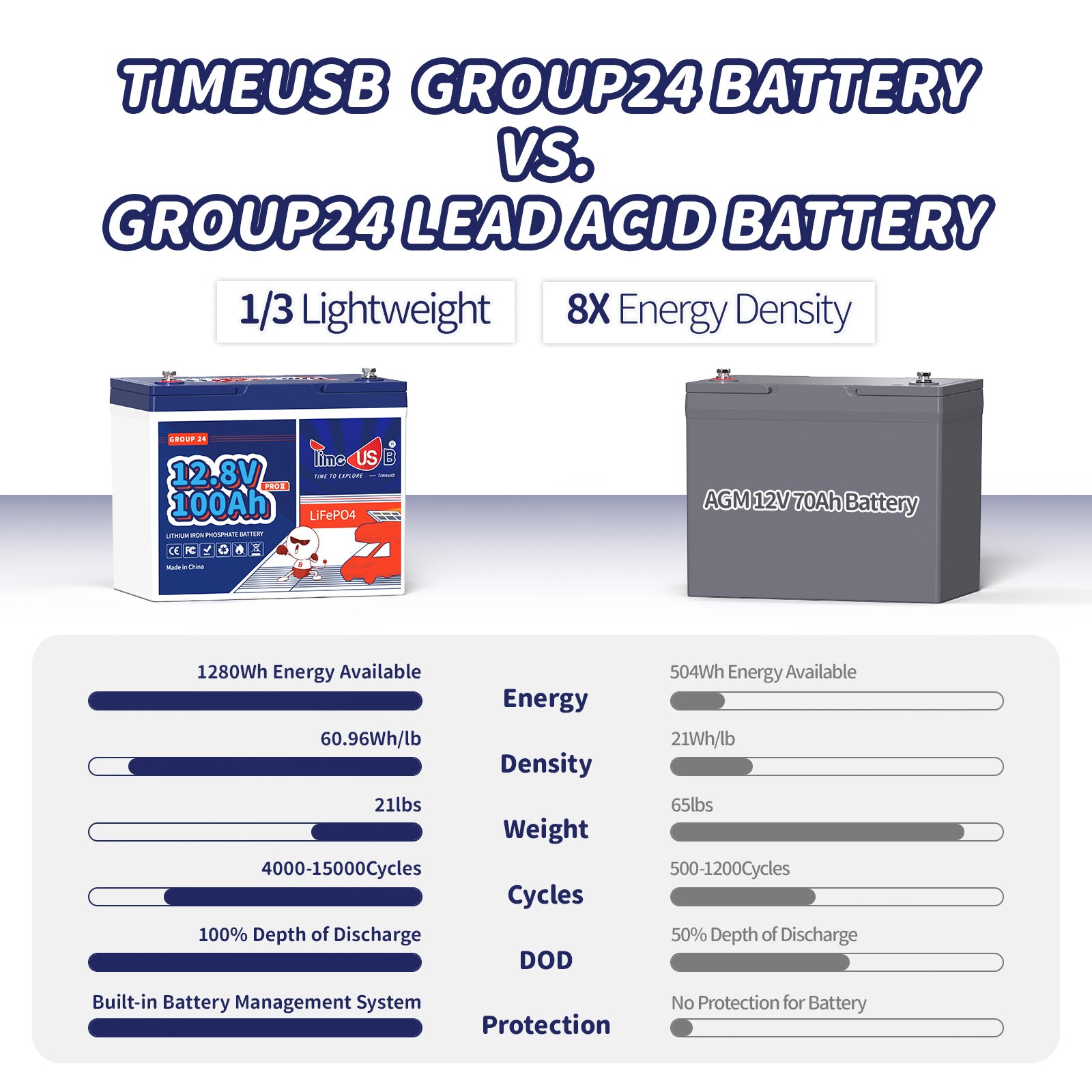
Energy Density Mastery: We pack more power into every unit, offering a significant advantage where space and weight are at a premium. Our batteries afford users the opportunity to maximize their power systems without increasing their footprint.
Eco-Friendly Solution: Investing in our Group 24 lithium batteries is a step toward sustainability. With our batteries, you're contributing to a future with fewer battery replacements, less waste, and more efficient power usage.
Uncompromised Safety and Quality: Safety is not a luxury—it's a necessity. Each Timeusb lithium battery integrates advanced safety features and is constructed with the highest quality materials, ensuring your investment not only performs but is also durable and secure.
Supportive Warranty: Recognizing the importance of customer peace of mind, we provide an industry-leading warranty that backs up our quality claims, letting you enjoy the benefits of your investment with complete confidence.
Frequently Asked Questions About Group 24 Deep Cycle Batteries
Can I use a Group 24 battery for my solar setup?
Yes, Group 24 batteries can be an excellent choice for solar power storage, but ensure your system is compatible in terms of voltage and capacity.
What is the difference between a deep cycle battery and a regular car battery?
A deep cycle battery is designed to provide a steady amount of power over a long period and can be discharged and recharged many times. A regular car battery provides a large burst of power to start the engine and is not suitable for deep discharge applications.
How do I know when it’s time to replace my Group 24 deep cycle battery?
Signs that it might be time to replace your battery include longer charging times, reduced runtime, and noticeable swelling of the battery case.
By understanding the features, benefits, and maintenance requirements of Group 24 deep cycle batteries, you can choose the right battery for your needs and ensure that it gives you a long and reliable service life. With proper care and usage, your deep cycle battery can be a dependable source of power for your adventures and off-grid needs for years to come.

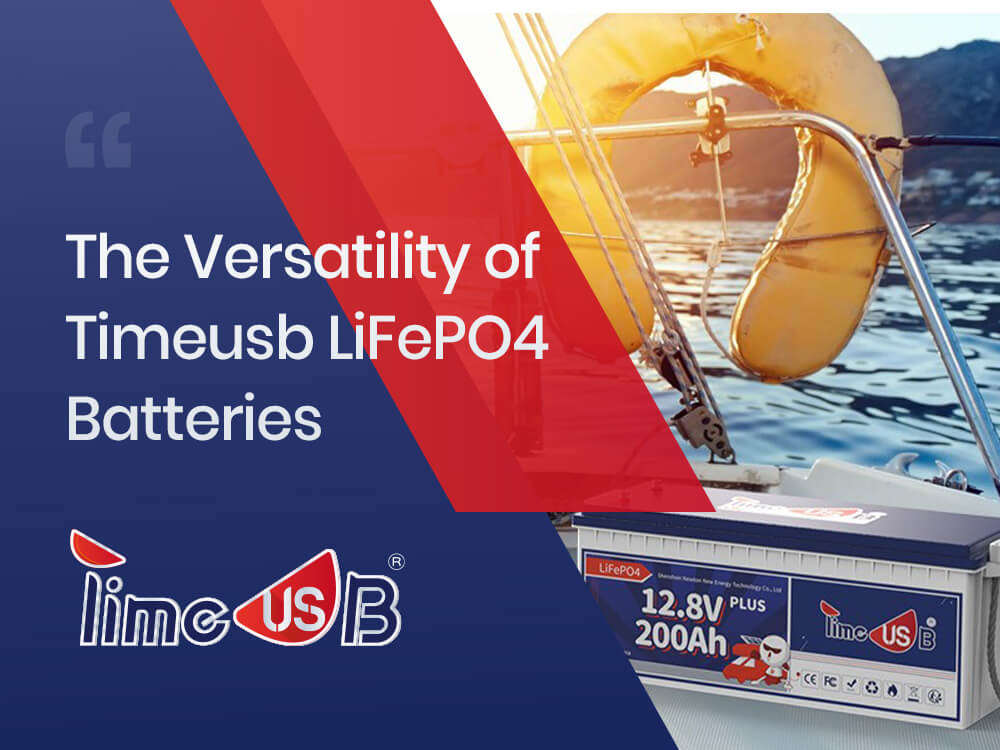
![[Full Guide] The Comprehensive Guide to LiFePO4 Battery Life](http://www.timeusbpower.com/cdn/shop/articles/The_Comprehensive_Guide_to_LiFePO4_Battery_Life_757d2749-9468-4739-ac83-0960c27749b0.jpg?v=1722918256&width=1080)
